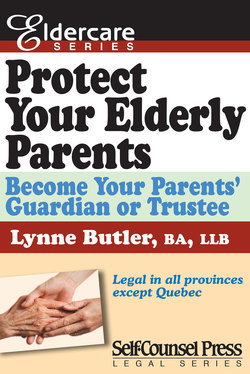Читать книгу Protect Your Elderly Parents - Lynne Butler - Страница 15
На сайте Литреса книга снята с продажи.
3. In the Best Interests of the Dependent Adult
ОглавлениеThere are not a lot of legal guidelines as to what does and does not constitute acting in the best interests of a dependent adult and it may not be easy for you to determine what is in the best interests of your elderly relative. Obviously acting in his or her best interests cannot mean that you only do what the dependent adult wants, as some of the wishes expressed by a dependent adult may be unreasonable. After all, you would not be in the position of guardian and trustee in the first place if the dependent adult was fully capable of making all his or her own decisions.
For example, many elderly people are understandably distraught at the thought of leaving their homes and moving into long-term care facilities or at the need to give up driving their own vehicles. This is often seen by the dependent adult as more of a punishment than anything as it represents a severe loss of freedom, independence, and even identity. However, you, as the guardian, may have no choice but to take steps to move the dependent adult or to have his or her driver’s licence revoked if the dependent adult simply cannot manage safely on his or her own any longer. In a case like that, what the dependent adult wants and what is in his or her best interest are not the same.
The wishes and intentions of a dependent adult should always be taken into consideration whenever it is possible to do so. Not all dependent adults suffer from a problem so severe that they can have no input whatsoever into things such as selection of birthday gifts for grandchildren, plans for vacation, or whether they need to see a doctor. Where the dependent adult is able to offer input that is reasonable in the circumstances, it is in the best interest of the dependent adult for that input to be heard and acted upon. Remember that you, as a guardian and trustee, have agreed to act in the least restrictive manner possible and you should remain open to opinions expressed by the dependent adult.
A mistake that is frequently made by children who become guardians of their parents is to set up matters in a way that is convenient for themselves, regardless of whether it is enjoyable, comfortable, or agreeable for the parents. This can lead to neglect and even abuse. It is absolutely essential that you work with your elderly relative to try to determine his or her wishes and to work within them whenever possible.
In determining whether having a guardian or trustee appointed for your elderly relative is in the elderly relative’s best interests, consider the following questions:
• Can the elderly relative make all personal and financial decisions for himself or herself safely and happily right now?
• If so, how long is that situation likely to continue?
• How would the elderly relative’s life be improved in the short term and in the long term by having a guardian or trustee appointed?
• What risk is the elderly relative running by refusing decision-making help?
• Is there an urgent situation existing right now that must be addressed quickly?
• Are there any solutions available that are less intrusive than a court-appointed guardianship or trusteeship? (See Chapter 3 regarding alternatives.)
• Has the elderly relative ever made any suggestions or given any instructions about who he or she would like to live with or who he or she would like to have in charge of his or her affairs?
Chapter 2 may help you answer these questions.
